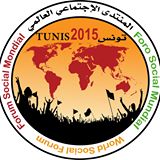Updates on the recent World Social Forum in Tunis
- OBSERVATIONS from INoSA Delegates at the WSF in Tunis
- Declaration of the Social Movements Assembly-Tunis WSF 2015
- World Parliamentary Forum Declaration 2015
2015, a key year for World Social Forum activists
by Bryan Carter, 31 March 2015
The 2015 edition of the World Social Forum (WSF) closed this Saturday with a march in solidarity with Palestine through the streets of Tunis, which was hosting this grand annual celebration of alter-globalisation for the second time.
During four days, over 1000 workshops, seminars and round tables brought together members of associations, NGOs, trade unionists, researchers and activists from 120 countries at the El Manar University campus, decorated for the occasion with countless posters and drawings calling for more fiscal justice, a healthy environment, free universal healthcare, new consumption models, or a people's revolution. Read more
World Social Forum 2015: Another World is Possible
This week, for the second time in a row, the World Social Forum (WSF) gathered in Tunisia, the birthplace of the Arab spring. During the five-day event,70,000 delegates from more than 4,000 organisations representing 120 countries discusseda wide range of issues and topics including, climate justice, immigration, media freedom, women's rights, refugees and energy.
A group from 350.org was in attendance to talk about climate justice, the growing divestment movement and the inter-sectionality between environmental, social, economic and political issues. See photos of WSF 2015 & more
WSF2015 | Change the system, not the climate! Aksel Naerstad, from Tunis, tells us about some of the key issues discussed in 2015 edition of the World Social Forum (WSF) and shares with us his impressions.
World Forum on Theology and Liberation
Leaders and activists coming from diverse faith traditions have been creating a space at the WSFs to meet and engage with each other in critical dialogues about how to support movements for emancipation and to transform humans' relationships with the earth. At this year's WSF, activists from diverse traditions and indigenous leaders explored the ways religion can be a basis for peace and justice and how indigenous spirituality and religious pluralism can contribute to movement building work.
Association for Women's Rights in Development (AWID) at the World Social Forum-"Challenging the One Percent"
"...The forces of justice, freedom and equity are being relentlessly pushed back. There is an urgent need to strengthen our collective voices and power, to further expand our shared analyses and build interconnected agendas for action. The WSF contributes to doing just that. At this year's WSF, there was a diversity of feminist activists in attendance and the systemic causes of global inequalities were addressed in intersectional ways linking new relationships to land, and land use to patriarchy, food sovereignty, decolonisation and corporate power."
Analyses: The Future of the World Social Forum is a topic of discussion and debate at each WSF. The challenge of creating a democratic body that represents all the diverse voices who need to be part of the WSF process is immense, and we are far from achieving that vision. Here are a few reflections on the latest meeting of the WSF International Council, which comes at a time when many are asking about the future directions (if any) the WSF process should take. Many are calling for abandoning this process in favor of one that emphasizes joint action over open space and deliberation. But others argue that if there was no WSF, we would need to create something like it.
- Those Who Want To Build, Those Who Want To Fight: The World Social Forum with a North African Twist, by
- Hamza Hamouchene "Power and resistance at the World Social Forum 2015" Perhaps it is a sign that the WSF is seen as a threat, but authoritarian governments have sponsored 'civil society' delegations to the forum in an effort to "hijack" space and confuse discussions. WSF organizers need a deliberate strategy for resisting elite influences.
- Roberto Savio "It should be clear what to expect from the WSF" The International Council continues to struggle with challenges of internal democracy and relevance.
- Henda Chennaoui "WSF 2015: Where is the Struggle Against Capitalism?" Another world is possible...but getting there will be tough!
Samir Amin on the World Social Forum, Globalization & the Barbarism of Capitalism [Video/interview] AMY GOODMAN / JUAN GONZÃLEZ - Democracy Now! As tens of thousands gather for the World Social Forum in Tunis, Tunisia, we speak to one of the most prominent radical thinkers in Africa ” the Egyptian-born economist Samir Amin. He is considered one of Africa's leading political economists and was one of the pioneers of describing modern human history from the perspective of the Third World, arguing that the countries of the South were not latecomers to capitalism, but were integrated into the global economy from the start in a position of dependency to the rich, industrialized North. He is presently director of the Third World Forum in Dakar, Senegal ” considered a precursor to the World Social Forum ” and since 1997, has been the chair of the World Forum for Alternatives.
------------
World Social Forum Returns to Tunisia for 2015
Grassroots Global Justice Alliance ”Delegation to WSF in 2015 (see also reports from GGJ's 2013 delegation & its work on the Climate Forum)
WORLD SOCIAL FORUM IN TUNISIA 2013 AND 2015 REFLECTIONS AND EXPECTATIONS, Rosa Luxemburg Foundation
How do young activists from the region evaluate the 2013 edition and what do they expect from the upcoming one? During the Tunisian Youth Social Forum (27-30 March 2014), the Rosa Luxemburg Stiftung (RLS) North-Africa office interviewed activists from the region to find out about their take on those issues. In the second part of this text, Christian Schröder analyses the WSF 2013 as a space providing for broad political participation by social movements and activist groups and provides recommendations for improvement.
